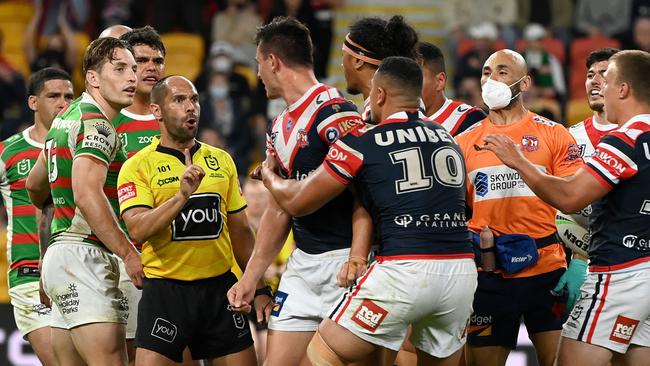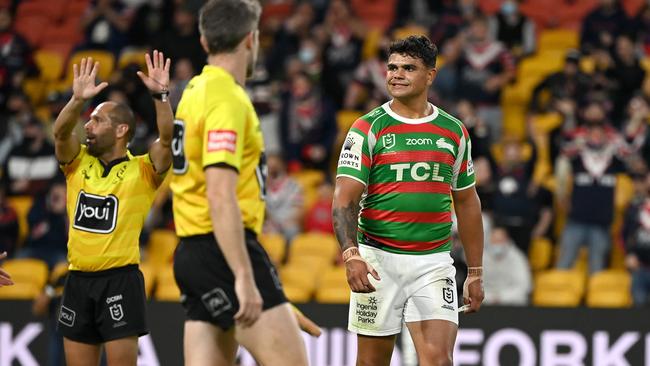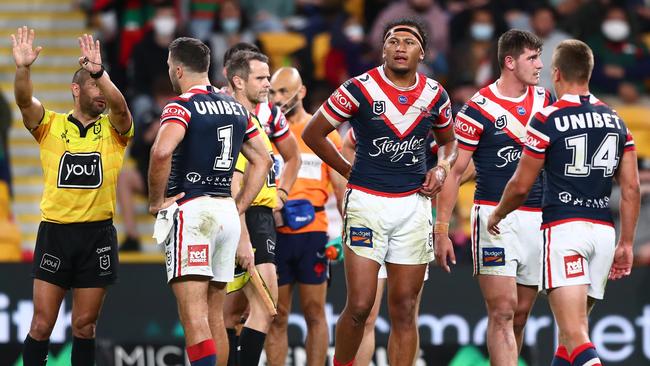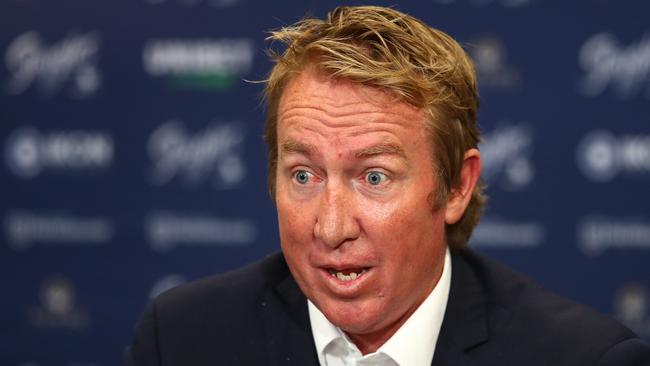Paul Kent: Referees caught in public relations battle of managing games rather than enforcing rules
The referees and those who control them have created the problem that led to the controversy around Latrell Mitchell’s hit on Joey Manu, PAUL KENT writes.

NRL
Don't miss out on the headlines from NRL. Followed categories will be added to My News.
Rugby league commentary is the great each-way bet in life, a fact which over the years has fascinated some of the world’s greatest minds for at least a good five minutes of their time, or part thereof.
In fact, Sir Isaac Newton’s little-known Twelfth Law states that, for every argument in rugby league, there is an equal and opposite argument, and stuff that in your jersey.
Or maybe it was Newton’s Sixth Law. Or maybe it was Clint Newton.
The race to the 2021 NRL Telstra Finals Series is on and every game matters. Watch Live & Ad-Break Free on Kayo. New to Kayo? Try 14-days free >
Regardless, the ineffectual way the NRL is once again administering its own laws has again brought a sharp focus on the whistleblowers and the consequences of their actions.
After all, jobs are at stake.

As the finals near and each decision on-field takes on greater consequences than, say, a ruling in round five, we are hearing more and more the dreaded phrase: I’d hate to see a grand final decided on that …
Just a fortnight ago, for instance, the Sydney Roosters benefited from an 80th-minute penalty when Tom Flegler brushed his hand across Sitili Tupouniua’s face.
The contact was minimal, and picked up only on replay, yet a penalty was given for a high tackle, as is written in the rules, and the Roosters kicked it home to win 21-20.
“I don’t think we were dudded,” Broncos coach Kevin Walters said after the game. “But if that decides a grand final …”
It was an emotional response.
The logic goes that the referee should have the discretion to decide what deserves a penalty because, it goes, the contact was not nearly enough to cause any real damage and so why blow a penalty at all?
Walters received plenty of support around the game from those who believe similarly.
The “grand final” reference is widely used to conjure emotion and is persuasive enough to sway most arguments.
Few want to see a grand final decided on light contact, with many commentators under the firm understanding that, back in their day, they could swing a blackjack in a tackle and, provided the head remained firmly secured to the shoulders when splashed with the magic sponge, there would be no dismissal.
The absurdity of it all, though, is that the rule is in place only because the pendulum once swung entirely the other way where it was decided that any contact, no matter how minor, should constitute a penalty. After all, a high tackle was a high tackle.
This came about because players began staying down after any high contact, no matter how incidental, in a bid to claim a penalty.
When some argued they should get up, or the referee should ignore their claims of injury, the argument was offered that “the referee is not a doctor” and so could not decide the force of contact and a penalty should be awarded.
Once the game began adjudicating in this manner, players began dropping like flies.
To the point the current plague in the game is players staying down and milking contact around the head in supposed “crusher” tackles.

Most of these tackles would not bruise a grape but, according to current interpretations, the referee has no option but to penalise the incidental contact.
And so to counter their gamesmanship the argument goes to … hate to see a grand final decided on that.
These problems started many years ago when the referees casually adjusted from adjudicating the rules to managing the game.
In an attempt to keep the penalty count down, thereby making it a “good game”, they began warning players that they were offside, or to get off quicker in the play-the-ball, or to put them on report for what were previously send-off offences.
Coaches latched on quicker than the referees could realise, though, and began preying on the referees leniency by instructing their players to stand offside, for example, and challenge the referees nerve to penalise them and thereby risk ruining a “good game” with penalties.
So bedlam ensued, wrestling took over, the ruck slowed down enormously and convenient arguments were created whichever agenda certain types wanted driven.

The referees have tried to survive since, mostly by creating an environment where they constantly chose the softer option, which they believed would be most popular, perhaps hoping it would all be sorted out later.
And so it ultimately led to the flashpoint of Friday night, when Latrell Mitchell should have been sent off for a tackle that broke Joey Manu’s cheekbone and, because the bunker went with the soft option of a 10-minute sin bin, and there was a feeling natural justice was not served, the injured Roosters standing on the sideline near rioted.
Roosters coach Trent Robinson aimed his peashooter at the referees and their inadequacies and found himself $40,000 lighter in the pocket for it, when nothing he said was wrong.
The referees and those who control them have created this problem — swinging the pendulum from one extreme of adjudication to the opposite extreme — in a long-running public relations exercise.
Get back to officiating the game and leave the managing of it to those who know better, wherever they hide.
More Coverage
Originally published as Paul Kent: Referees caught in public relations battle of managing games rather than enforcing rules





